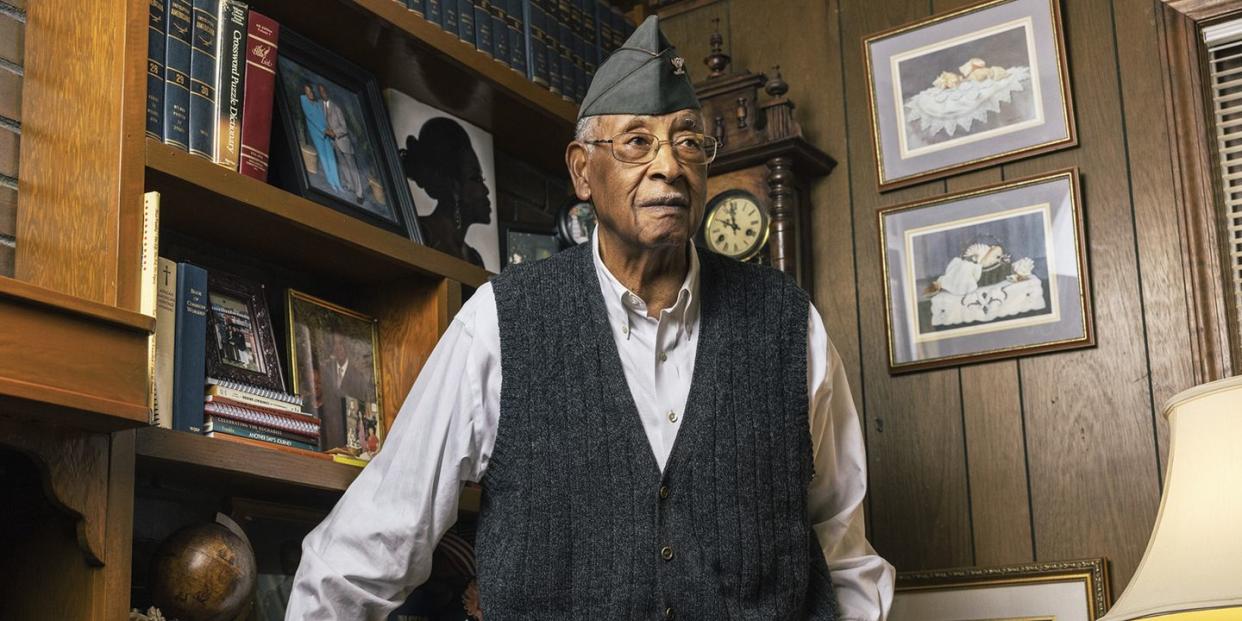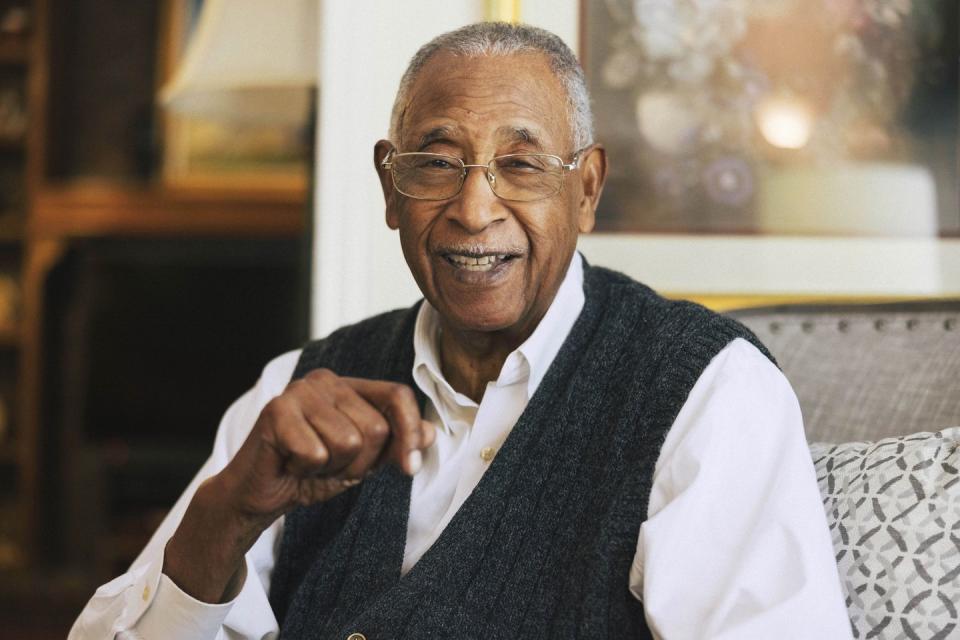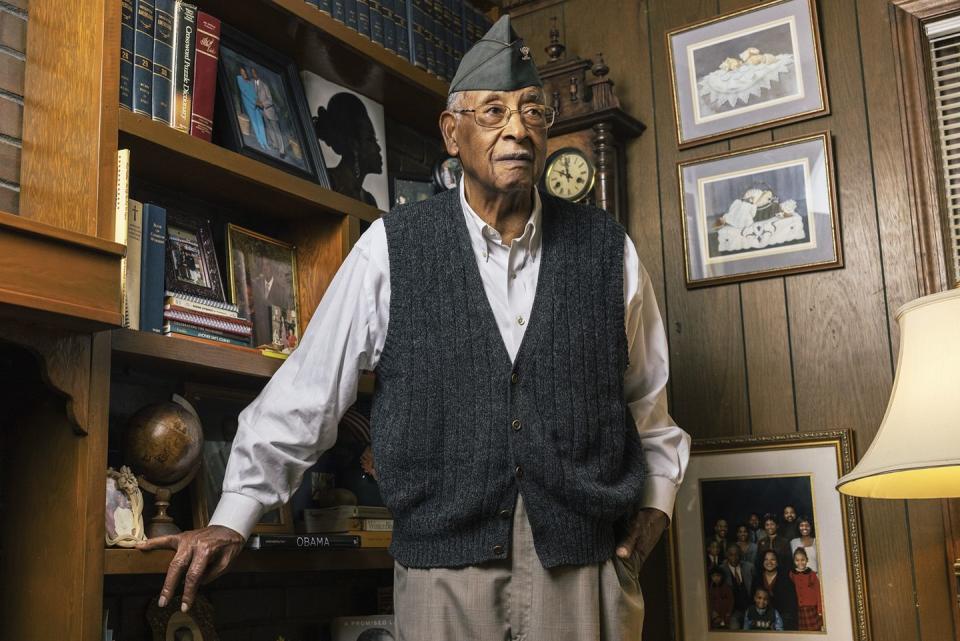George Burnette Created a Runway for Black Air Traffic Controllers

“Hearst Magazines and Verizon Media may earn commission or revenue on some items through the links below.”

Interview by Kristian Rhim/
Photograph by Lynsey Weatherspoon
George W. Burnette III, 87, served two tours of duty in Vietnam and retired as a Colonel from the U.S. Army. As an HR specialist at the Federal Aviation Administration, he recruited many Black and minority air traffic controllers. He is renowned for his barbecue sauce, which won “The 100 Black Women of Atlanta’s Annual Gourmet Gents Best in Show Award” for several years running.
Kristian Rhim: You served two tours in Vietnam during the '60s, and in America during the '60s, young Black Americans began challenging racism in the country and we saw the height of the civil rights movement at that time. What was it like for you fighting in the Army for America as a Black man while Black people were protesting in the streets back home?

George Burnette: That was my chance to go to college. If you joined a service and you did the time, good time, got a discharge, you went to college. That’s the only way I could go to college. I was going to go to college on a pilot work plan, Tuskegee had one, but I couldn’t get the money I’d earned to go to school; that’s why I joined the Army.
KR: In your time at the FAA, you recruited more Black air traffic controllers than anyone else. Why did you think it was important to bring young Black people into the aviation field?
GB: Well, there weren't that many who were qualified. We started a program, signed an agreement with the historically Black colleges. From that point on, we began to bring Blacks into the FAA. Even today, 40 years later, 30 years later, I got a few people I recruited who are still working as air traffic controllers. Most of them are supervisors now. I’m proud knowing how many folks I've put to work at FAA, and they’re happy, too. As a matter of fact, they had a dinner once a year, a big dinner, and they named that dinner in my honor.
KR: Is there a defining experience that you’ve had that was a struggle? Maybe something that you thought you wouldn’t make it through, but it actually made you stronger?

GB: Yes, I had a struggle in life. I was born on a slave plantation. My whole life, I went farm to farm, and I thought I’d never get out of it. In sixth grade, I had to plow a mule, every day, six straight weeks. And I was getting to think, How am I going to make it through life, without education? So I started studying at night. I would study at night, every night from the fifth grade through high school. I would plow all day and study at night. And I managed to get through high school.
I wanted to go to Tuskegee to school. So I applied to Tuskegee under the family work plan. They sent me a catalog and paperwork to fill out. My Dada made me a promise that spring: I’m going to give you some money this year, I’m going to plow like a slave. But he changed his mind. He gave me 20 bucks. And told me, Wait till next year. So then I joined the Army. And after the Army, I managed to get into Tuskegee. And I didn’t know anything, so I took English over and over, three times. I took math three times. After one term I was on probation, my grades were so low. But I studied night and day, night and day. And I finally got off of probation. I couldn’t sing in the choir, couldn’t do nothing, my grades were so low. But I managed to finish Tuskegee in four years.
That’s why I wrote this book. I want my kids to see that wherever you come from in this world, if you give folks a vision, you can get somewhere with your life. The title of my book is, It’s Not Where You’re From but Where You Wish to Go.
About the Journalist and Photographer
Turn Inspiration to Action
Consider donating to the National Association of Black Journalists. You can direct your dollars to scholarships and fellowships that support the educational and professional development of aspiring young journalists.
Support The National Caucus & Center on Black Aging. Dedicated to improving the quality of life of older African Americans, NCCBA's educational programs arm them with the tools they need to advocate for themselves.
Credits: Lynsey Weatherspoon: Melissa Alexander
This story was created as part of Lift Every Voice, in partnership with Lexus. Lift Every Voice records the wisdom and life experiences of the oldest generation of Black Americans by connecting them with a new generation of Black journalists. The oral history series is running across Hearst magazine, newspaper, and television websites around Juneteenth 2021. Go to oprahdaily.com/lifteveryvoice for the complete portfolio.

You Might Also Like

